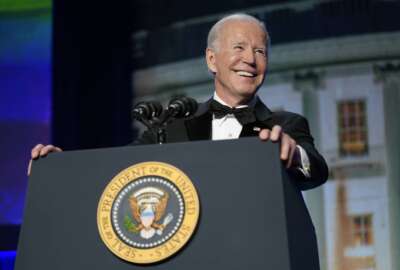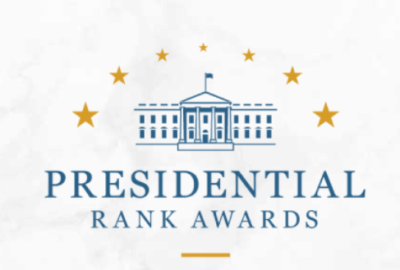‘Tis the season to honor those who serve the country with distinction
It's that time of year once again, the season to honor those who serve the country with distinction. The Partnership for Public Service has announced finalists ...
Best listening experience is on Chrome, Firefox or Safari. Subscribe to Federal Drive’s daily audio interviews on Apple Podcasts or PodcastOne.
It’s that time of year once again, the season to honor those who serve the country with distinction. The Partnership for Public Service has announced finalists in the Service to America Medals, or Sammies, program. This year there’s a special category for COVID-19 response. For more, the president and CEO of the Partnership, Max Stier spoke to the Federal Drive with Tom Temin.
Interview transcript:
Tom Temin: Max, it’s too bad the COVID response in the COVID pandemic is kind of the negative gift that keeps giving but for public service, it really is an ongoing chance for distinction, isn’t it?
Max Stier: It is, and it’s an example of, you know, real power that the federal employees can provide in helping people at a moment of great need. And as you say, we wish it were and so but we live in a world of a lot of problems. And really, our public service is there to help.
Tom Temin: Of course I’ve been covering Sammies, now, probably 20 years or so. But just give us the quick story on what this program is all about. For those that might be new to it and maybe aspire to get one one day.
Max Stier: Awesome. Well, the quick story is that it’s the Oscars of government service. And what we recognized very early on in our tenure, we’re 21 years old was that the organization gets better if all you do is kick it. And you need to identify and recognize the extraordinary people inside government if you want more of them. And so there’s sort of two parts to Sammies. One is trying to reinforce the positive inside the federal government. And then secondly, share those stories with the American public which doesn’t know their own government and certainly not their own public service. We’ve done some research on trust in government and what we found were that when you say federal government, people think about the politicians and Congress, and they don’t think very well of them. But when you explain to them about the civil service, and the people who like the Sammies honorees, you are helping them in the places that they live, their views changed dramatically. So getting these stories out actually has huge impact for the public’s understanding and for those recognized and those who want to be like them.
Tom Temin: And how far back does this program go, by the way?
Max Stier: So this is our 21st year was, you know, one of our first programs that we started, we also started an organization of universities to promote public service on their campuses and get talent into government. And those were sort of the two first things we did and shortly thereafter the best place to work ranking. So it was a busy opening for us as an organization. And it’s great to see those programs flourish and make a difference.
Tom Temin: The full name of the program, of course, is the Samuel J. Heyman Service to America Medals, and review for us Mr. Heyman’s career and impact on this.
Max Stier: He’s the reason why I’m doing what I’m doing and why this organization exists. He was a brand new newly minted lawyer in 1963, coming out of Harvard Law School. And he did what a lot of his classmates did, which was to go to the Department of Justice, which was run by Bobby Kennedy at the time, who we met a couple of times. And he worked for five years at the Department of Justice before he left to take over his family, his dad died to take over the family business. And it was his, you know, the most meaningful experience in his life was working for the U.S. government. And fast forwarding a number of years, he realized that top talent wasn’t looking to the government in the same way as when he had graduated. And he got concerned about that. So I met up with him 21 years ago, and he said, if I commit $25 million to you over the next five years, will you put together a business plan to start an organization and I did not have a better offer. It was a is something that excited me. And that was the genesis of the partnership.
Tom Temin: Yeah. And so now you’ve gone 21 years with it, not just the first five that he originally envisioned, and review the process by which the Sammies are conferred. Because you’ve got a pretty august, blue ribbon group here in charge of this.
Max Stier: We do and it’s, you know, just the beginning of the beginning, which is, you know, we need to, you know, have a recognition culture in government. And, you know, if you look at the Federal Employee Viewpoint Survey data, many, many federal employees don’t believe that their good work is recognized. So it begins, frankly, with colleagues, bosses, customers, anyone but the individual involved can actually nominate somebody, we get between 400 to 500 nominees every year, and I hope everyone will be thinking about who they want to be nominated for next year, because that process will kick off pretty soon. And it’s a very simple nomination process, then we conduct a very rigorous review process that usually involves the former Sammies honorees themselves because they know best, you know, what is a real achievement who are the people really doing the work and we then whittle down that 400 to 500 nominees to 30 in a set of categories. As you noted earlier, the categories can change depending on what the issues are of the day, and we then announce them now, Public Service Recognition Week. In the fall, we have a blue ribbon panel of foundation presidents, university presidents, corporate CEOs, members of Congress, they’re the ones who actually select the winners amongst the finalists. I will say they’re all honorees but ultimate winners then get vetted at a black tie event at the Kennedy Center. And that will be taking place on Sept. 20. There’s also a film that we do so people should check that out. When we recognize because of the pandemic, we can reach many, many, many, many more people by actually creating an engaging film, it’s under 60 minutes. And it’s a bunch of really well known comedians who tell the story of government. And it’s quite exciting to again, to see the 1000s, hundreds of 1000s of people that now can see the work of their government, we have more work to do to get the word out. But doing the film helped a lot.
Tom Temin: And in watching these awards all of these years, is there any thread, do you think that connects all of the winners, because they come from just a vast variety of backgrounds, and they have a vast variety of missions that they’re actually doing.
Max Stier: So you’re right. It’s everything you can think of making a difference in very, very big ways. There are some common thematics, one of them is the incredible modesty of these honorees, I mean, all of them look around the room, when you announce the finalists, and they look at their colleagues and say, they’re gonna win, not me, because they’re so amazing. And no one looks at themselves in the mirror and say, I’m amazing, too, it’s really quite extraordinary how, how modest, these folks are given the achievements that they are responsible for. I will say that there’s not infrequently an over sampling of first generation Americans. And I think that says a lot about the understanding of the value of government that many who come to this country more recently have, you know, another element that I think is really prominent is the way in which they fundamentally see themselves as stewards of the public good. And that’s really what motivates them. We did a study with a company that looked at innovation in the private sector and government. And one of the big differences they said, between what they saw in government and the private sector was that in the private sector, if you run into barriers, you just leave the company you’re in or you start your own organization. But all these people made it work where they were, and they manage the incredible barriers to success without giving up and throwing in the towel. So that persistence piece is also very prominent.
Tom Temin: They seem to have the right filter on, they have visionary sense of what it is they’re doing for their work and for the impact of that work. But they really do a good job of filtering out the politics that they work in and around sometimes because they can’t help it because it’s the federal government, but they pretty much keep that at bay in pursuing that mission. That’s something I’ve noticed.
Max Stier: Yeah, mission first, and they’re generous and understanding that, you know, sometimes it’s individuals, but usually is teams and they understand that this is a team sport, and that they can have way more impact by engaging a lot of people and treating them well. And so that’s another element that you find across many of the honorees. They’re amazing people they just are, it’s we’re lucky to have them.
Tom Temin: Well, we’re gonna hear them in this place. And this time, every Thursday now until September, when the gala takes place.
Max Stier is president and CEO of the Partnership for Public Service. Thanks so much for joining me.
Max Stier: Thank you for your continued focus on this. This is an important service you are doing by bringing attention to these folks. So thanks.
Copyright © 2024 Federal News Network. All rights reserved. This website is not intended for users located within the European Economic Area.
Tom Temin is host of the Federal Drive and has been providing insight on federal technology and management issues for more than 30 years.
Follow @tteminWFED






